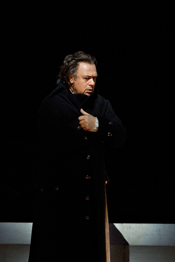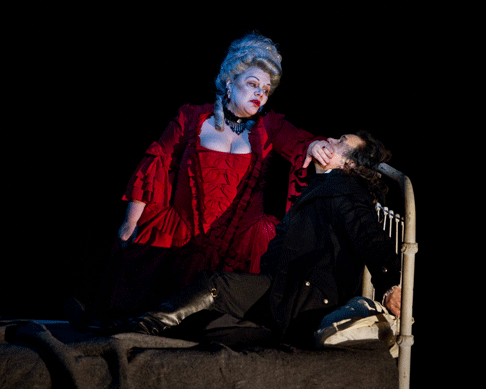(There are seven in the opera; he’s in every one.) At first, he
seems undecided whether he is crazed by poverty, by the contempt of his fellow
officers or by his yearning for an unknown beauty, who turns out to be Lisa, a
typical Russian girl just waiting for a brute to toss her around to fulfill his
obsessions. (“I am your slave; I belong to you”—per Met
TitlesTM.)
The confusion in Ghermann’s character is courtesy of the librettist,
Modest Tchaikovsky—in Pushkin’s splendid short story, Ghermann
doesn’t give a damn about the girl, only about money, and he seduces her
only to learn the Countess’s magical secret of winning at cards—a
secret that may exist only in his mind. But an opera is not a short story, and
Modest knew his brother Pyotr’s penchant for romance and drama: As with
Eugene Onegin, also taken from a Pushkin source, irony went out the
window in order to let the score’s passion fill the room. Had the
composer been truer to Pushkin, his operas would have been far less successful
than they are—both artistically and with the public. And The Queen of
Spades is a great favorite, if the tenor is mad enough, the soprano wild
enough, the Countess sinister enough, the conductor in control of things.
 Vladimir Galouzine as Hermann
Vladimir Galouzine as Hermann
Elijah Moshinsky’s 1995 production was devised for the farewell (to
the Met, to the stage, to life as a matter of fact, for she received her cancer
diagnosis during the run) of Leonie Rysanek in the title role—she would
hardly have consented to depart with anything less. The climax of her final
performance was her ghostly appearance in Act III, not from the shadows of
Ghermann’s room but bursting through the floor, backed by the flames of
Hell, creeping in a singed red satin Ancien Regime ball gown (who wore
red at Louis XV’s Versailles?) across the floor and actually
into bed with the gibbering Ghermann of Gegam Gregorian to give him the secret
of the three cards, while he seemed to lose what little remained of his sanity
before our very eyes. This madcap staging would never suit any other lady, and
subsequent Countesses have modified it considerably, though they still enter
through the floor in uncompromising crimson—almost the only color in the
costumes all night long. Elisabeth Soederstrøm (also bidding farewell to the
Met) managed to make this work while just standing there by the bed, rigid,
cold, unwillingly handing the cards to Plácido Domingo, who seemed shocked but
hardly insane.
In the current revival, Dolora Zajick, a no-nonsense lady who shows no sign
of needing a stick (she whacks Vladimir Galouzine over the head with it when he
pulls a gun on her), seems neither supernatural nor doomed when she climbs
through the floor. She might be a neighbor come to complain about the noise.
She looks irritated by his bad behavior but hardly vindictive or supernatural.
It is the keynote of her entire performance: down to earth, where the Countess
should be uncanny even while she’s alive. This is a ghost story without a
haunt. When Zajick appears at the very last, to the dying Ghermann, she
possesses all the mystery of a concierge come to collect an unpaid dry cleaning
bill.
(One of the most tiresome tricks of stage directors bereft of ideas is to
show us the ghost, vision, dream, phantasm of a character who is imagining
things. Bringing the Countess on stage in the last moments is a symptom of
this, though it could be worse—Francesca Zambello brought back Lisa, too,
at this moment. And then there’s the ghost Mary Zimmerman provided in Act
I of Lucia to distract us from the soprano’s cavatina. Lucia
can’t see this—only we do. Why? But you get the idea.)
Zajick is, in any case, too young or just too brash to play the Countess, a
role that should be sung with presence, with gesture, with the wisp of faded
voice and not the bellow of a woman who thinks she’s singing Amneris.
That marks her contrast with Galouzine and Karita Mattila, who are rather old
to play Ghermann and Lisa.
 Dolora Zajick as the Countess and Vladimir Galouzine as Hermann
Dolora Zajick as the Countess and Vladimir Galouzine as Hermann
Galouzine’s voice never did have youthful bloom, and his excursions
into Italian lyric roles like Des Grieux have not been happy. Curiously, his
best Italian role has been Canio in Pagliacci, another man under
pressure, going mad before our eyes. This is his long suit. He never gets too
crazy too soon, and his bulging eyes and jack o’ lantern grins deepen in
precise parallel with the developments of the story. His voice is not a thing
of great beauty, but he turns its shrillness to the service of a portrait of
hysteria. His Ghermann is one of the highlights of the current Russian
repertory; he will be remembered nostalgically when many a more honeyed tenor
takes the part. And if, short and pudding-faced as he is, he hardly looks the
romantic type, imaginative adolescent girls will throw themselves at anybody,
won’t they?
I missed Mattila’s Lisa when this production was new, and I’ve
been kicking myself about that for years. Her figure is still striking, her
acting forcible, and her voice full of beautiful notes and qualities (as she
revealed singing “Ah, Perfido!” and some Sibelius songs with the
Philharmonic last winter), but the easy top that once spun over the lines of
Strauss’s Arabella and Chrysothemis, and made her peasant girl Jenufa
credible quite recently, has faded—due to age or due to singing Puccini,
I’m not sure which. (Fortunately, Makropoulos Case, for which
she is scheduled here next season, goes no higher than B-flat. But
Turandot? Out of the question. Ballo in Maschera? I
don’t think so.) There were glorious phrases in her singing the other
night, ardent girlish cries of passion and anguish, but there were also
embarrassing moments when she could not maintain a pitch or, as on the final
outcry of surrender of her great Act I duet with Ghermann, could not get near
it at all. She covered well—she’s a singing actress the match of
Galouzine, a frequent collaborator. I missed the youthful ardency of her Jenufa
or Katya, but I suspect those chancy top notes will improve as she gets used to
singing the role again.
Peter Mattei is so tall and slim he looks quite odd as Prince Yeletsky, and
his aria to Lisa lacked the sensual yearning Dmitri Hvorostovsky brought to
this lovely number. He seemed uncomfortable and cold—which may be an
acting choice. We could not quite believe Lisa would break an engagement with
Hvorostovsky’s Yeletsky on any account; Mattei showed us just why she
would. Alexey Markov, so impressive in his brief role in Boris Godunov
this season and an excellent Prince Andrei in War and Peace, took the
small roles of Count Tomsky (who starts the plot rolling with his tale of the
Countess and the three cards) and Plutus in the divertissement, and
provided the most luxurious and pleasurable singing of the evening. Tamara
Mumford, the Pauline (Borodina’s breakout role), displayed a lovely alto
but needs a Russian coach. Dina Kuznetsova made a charming debut as Chloë.
Under the able if unimaginative direction of Andris Nelsons,
Tchaikovsky’s sprawling score seems longer than ever. If the Met truly
wants it to run shorter (and the elimination of an intermission suggests it
does), they might consider cutting the divertissement in Act II. The
Met chorus do “Russian” dances in a manner that can only embarrass
their friends and amuse the Russians in the audience. The many charms of this
opera, the first Russian work ever presented by the Met (back in 1910) and also
the first to be performed there in Russian (as recently as 1972), require a bit
more focus on such details as Russian accents and dance steps to create the
spectacular evening the composer desired. On the other hand, at only minutes
short of midnight, the theater was still full of happy opera-goers.
John Yohalem
![Karita Mattila as Lisa [Photo by Marty Sohl courtesy of The Metropolitan Opera]](http://www.operatoday.com/QUEEN_Mattila_as_Lisa_1577.gif)

